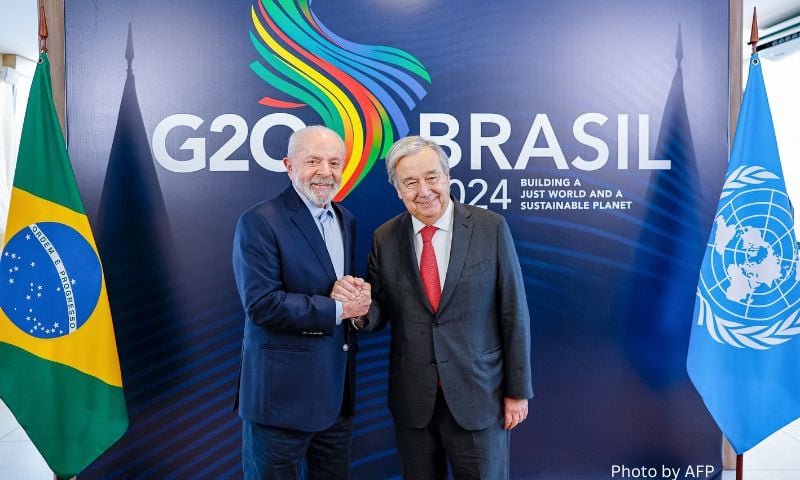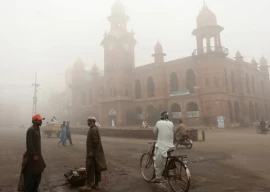
Brazil is gearing up for the G20 summit on November 18 and 19 when it will host the most influential leaders of the world as G20 is a product of economic and climate crises, but it has not yet been able to tackle these challenges because of mainly focusing on geopolitics, taking a heavy toll on its credibility.
G20 should separate itself from the US foreign policy and the geopolitical agenda with a view to fixing geoeconomic issues, enhancing cooperation, doing away with trade wars and a cold war, if any.
Pakistan-China Institute Chairman Mushahid Hussain Sayed said G20 was supposed to be a bridge between the advanced industrial states in the West plus Japan, who form the G7 (a grouping of seven advanced economies including Canada, France, Germany, Italy, Japan, the United Kingdom and the United States), and the leading emerging economies of the Global South. However, G7 has become an adjunct of the US foreign policy, for example, their ideological position against China.
At the last G20 summit in India, US President Joe Biden and Indian Prime Minister Narendra Modi announced the India-Middle East-Europe Economic Corridor (IMEC) to counter China's gigantic Belt and Road Initiative (BRI), but fortunately it has been buried under the rubble.
Under the Biden administration, the G20 was heavily influenced by the American New Cold War agenda, which focused more on geopolitics than geoeconomics, hence, weakening its role and credibility. G20 should stop being an instrument of the US foreign policy nor follow the geopolitical agenda. Its focus should be on geoeconomics and it should serve to unite, not to divide, promote connectivity and cooperation among countries like China and the US.
The grouping should oppose any new cold war, oppose protectionism, trade wars and politically motivated sanctions, and should be a vehicle for economic multilateralism and free trade.
Also, it should pay attention to issues like climate change, artificial intelligence (AI), cybersecurity, regional economic connectivity, transfer and sharing of knowledge in science and technology.
Being a multilateral platform, G20 represents about 60% of global population, 80% of global GDP and 75% of global exports. Rio de Janeiro is hosting this month's event. The focus of Brazil's G20 presidency is on global governance reform, social inclusion and energy transition.
Brazil took over the G20 presidency from India last year. It is preparing to receive the heads of state during the summit beginning on Monday.
The summit represents the conclusion of work carried out by the country through holding the group's rotating presidency. It is the moment when the heads of state and government will approve the agreements negotiated throughout the year and will point out the ways of dealing with global challenges.
The summit in Rio de Janeiro will see the presence of leaders of 19 member countries except for the African Union and the European Union as the world battles a number of conflicts from Ukraine to Gaza. The gathering will enable leaders to cope with critical issues confronting the globe. This is going to be a big moment for the African Union after it has joined the G20.
At the G20 platform, global economic cooperation is facilitated by supporting emerging and developing economies to achieve sustainable development, which is the key to global stability and security. This week's summit marks a special moment as Brazil is due to hand over the G20 presidency to South Africa on December 1.
SABC news has reported that Russian President Vladimir Putin will not attend the gathering due to the arrest warrant issued by the International Criminal Court following the Russia-Ukraine war.
Biden will bid farewell to the leaders since his term is coming to an end. Chinese President Xi Jinping will attend different sessions, especially in the wake of close ties between China and Brazil as BRICS members.
Analyst Professor Dr Huma Baqai said no multilateral organisation or forum had achieved all the goals that were set out to achieve. G20 is the same.
As the engine of economic growth has moved from the West to the East and the South, it is becoming more powerful. G20 is also seen as an entity to reckon that.
The latest push by G20 to tax the very rich is of course facing resistance because even the countries that are part of the grouping are ambiguous about it.
G20 can raise issues of poverty, climate change, climate financing and bridge the gap between the North and the South. However, it is a tall order to separate geopolitics from geoeconomics. Geoeconomics impact geopolitics or vice versa. The future strategy should be to enhance cooperation among member countries.
Senior analyst and former ambassador M Alam Brohi said G20 had a significant role to play in building back a better world. However, the leaders failed to agree on phasing out fossil fuels. Its member states, home to 93% of the world's operating coal power plants and around 80% of global emissions, committed only to the "phase-down of coal".
Pakistan is a member of many important economic forums and regional groupings. But its role has remained peripheral for a number of factors.
The major and medium-sized economies that have progressed well have heavily invested in education, promotion of technology, healthcare and human resources as well as followed a constitutional order defining the roles of state institutions including the executive, legislature, judiciary, and ensuring non-partisan constitutional bodies, an independent judiciary and honest civil services.
"We have failed to show the will to overcome the yawning gap between revenues and expenditures. This gap has kept on widening forcing us to resort to excessive borrowing and bailouts," Brohi said.
"We have to tackle our political and economic problems on an emergency basis, if we want to have a reasonable share of the pie in the changing global geoeconomics and to leverage the most influential multinational forums."
The writer is a staff correspondent


1725784957-0/Tribune-Pic-(17)1725784957-0-165x106.webp)
1724760612-0/Untitled-design-(12)1724760612-0-165x106.webp)














COMMENTS
Comments are moderated and generally will be posted if they are on-topic and not abusive.
For more information, please see our Comments FAQ